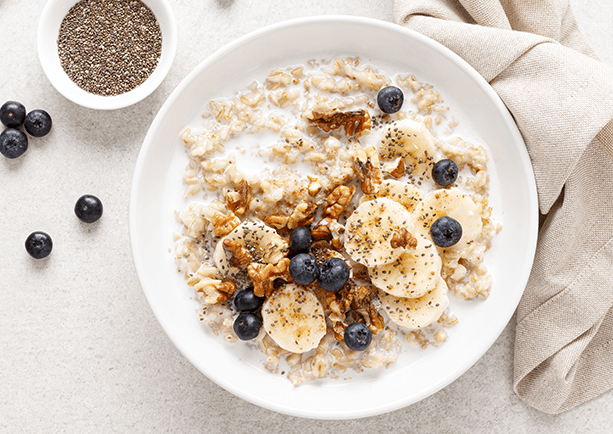15-Day Hashimoto's Meal Plan for Thyroid Health

"Health is the greatest wealth." This timeless proverb reminds us of caring for our bodies, especially when dealing with chronic conditions like Hashimoto's disease. Hashimoto's, an autoimmune disorder that affects the thyroid gland, can be challenging to manage, but a well-planned diet can make a significant difference. The right foods can help reduce inflammation, support thyroid function, and improve overall well-being.
This 15-day Hashimoto's meal plan is designed to do just that. By focusing on nutrient-dense, anti-inflammatory foods, you can better manage the symptoms of Hashimoto's while promoting thyroid health. Let’s explore how a carefully crafted Hashimoto's meal plan can support your thyroid and overall wellness.
What Is a Hashimoto Diet?
A Hashimoto diet is a carefully planned dietary approach to manage the symptoms of Hashimoto's disease while supporting overall thyroid health. Since Hashimoto's is an autoimmune disorder that leads to chronic thyroid gland inflammation, the diet focuses on reducing this inflammation and providing the essential nutrients needed for optimal thyroid function.
What Is Thyroid Disease?
Thyroid disease is any condition that affects the thyroid gland, a small butterfly-shaped gland located at the base of your neck. This gland regulates metabolism, energy levels, and hormone balance. The two most common types of thyroid disease are:
Hypothyroidism: An underactive thyroid that doesn’t produce enough hormones, leading to symptoms like fatigue, weight gain, and depression.
Hyperthyroidism: An overactive thyroid that produces too many hormones, causing symptoms like weight loss, rapid heartbeat, and anxiety.
Impact: Thyroid diseases can affect many bodily functions, including heart rate, body temperature, and metabolism. Managing thyroid health is essential for maintaining overall well-being.
Which Foods Can Affect the Thyroid?
- Goitrogenic Foods: Certain foods, known as goitrogens, can interfere with thyroid hormone production, particularly when consumed raw. These include:
- Cruciferous Vegetables: Broccoli, cauliflower, kale, and Brussels sprouts.
- Soy Products: Tofu, soy milk, and other soy-based foods can disrupt hormone production.
- Gluten: For individuals with Hashimoto's disease, gluten can trigger autoimmune responses that further damage the thyroid gland. Avoiding gluten-containing grains like wheat, barley, and rye may help reduce symptoms.
- Excess Iodine: While iodine is essential for thyroid function, too much can be harmful, especially in those with pre-existing thyroid conditions. Foods high in iodine, such as seaweed, should be consumed in moderation.
- Processed Foods and Sugars: These can increase inflammation and contribute to weight gain, exacerbating thyroid-related symptoms. Reducing the intake of processed foods and sugars is beneficial for thyroid health.
- Caffeine and Alcohol: Excessive consumption can stress the thyroid gland and disrupt hormone balance. Limiting these substances can support better thyroid function.
What are the Benefits of Hashimoto's Meal Plan for Thyroid Health?
Reduced Inflammation: The meal plan focuses on anti-inflammatory foods, helping to reduce chronic inflammation associated with Hashimoto's disease.
Improved Thyroid Function: The plan supports optimal thyroid hormone production by including nutrient-dense foods rich in selenium, zinc, and iodine.
Stable Energy Levels: The plan emphasizes balanced meals with low-glycemic-index foods, which help maintain steady energy levels throughout the day.
Weight Management: The meal plan is designed to support healthy weight management, which is often challenging for those with Hashimoto's.
Enhanced Gut Health: The plan incorporates probiotics and fiber-rich foods to promote a healthy gut, which is crucial for overall immune function and thyroid health.
Sample 15-Day Hashimoto's Meal Plan for Thyroid Health
|
Day |
Meal |
Food Items |
Calories |
Benefits |
|
1 |
Breakfast |
Smoothie with spinach, berries, flaxseed, almond milk |
300 |
Anti-inflammatory, high in antioxidants, supports gut health |
|
|
Lunch |
Grilled chicken salad with mixed greens, avocado, olive oil |
450 |
Rich in healthy fats, protein, and vitamins for thyroid support |
|
|
Dinner |
Baked salmon with quinoa and steamed broccoli |
500 |
High in omega-3s, selenium, and fiber for thyroid function |
|
|
Snack |
Apple slices with almond butter |
200 |
Provides healthy fats and fiber to stabilize blood sugar |
|
2 |
Breakfast |
Gluten-free oatmeal with chia seeds and fresh fruit |
350 |
Gluten-free, high in fiber, and rich in omega-3s |
|
|
Lunch |
Lentil soup with a side of mixed greens |
400 |
High in plant-based protein, iron, and fiber |
|
|
Dinner |
Grass-fed beef stir-fry with broccoli and brown rice |
|
550 |
|
|
Snack |
Greek yogurt with honey |
150 |
Probiotics for gut health, low glycemic index |
|
3 |
Breakfast |
Scrambled eggs with spinach and gluten-free toast |
350 |
Protein-rich, supports muscle and hormone production |
|
|
Lunch |
Turkey wrap with gluten-free tortilla, avocado, and leafy greens |
400 |
Gluten-free, rich in protein and healthy fats |
|
|
Dinner |
Baked cod with sweet potato and green beans |
450 |
High in omega-3s, vitamins A and C |
|
|
Snack |
Mixed nuts |
200 |
Healthy fats and selenium for thyroid function |
|
4 |
Breakfast |
Smoothie with kale, pineapple, and chia seeds |
320 |
Anti-inflammatory, high in antioxidants, supports immune health |
|
|
Lunch |
Grilled chicken with quinoa and steamed vegetables |
450 |
High in protein, fiber, and essential vitamins |
|
|
Dinner |
Turkey chili with brown rice |
500 |
Rich in protein, fiber, and low glycemic index carbohydrates |
|
|
Snack |
Celery sticks with almond butter |
180 |
Provides healthy fats and fiber |
|
5 |
Breakfast |
Greek yogurt with blueberries and flaxseed |
300 |
Probiotics, high in fiber, and antioxidants |
|
|
Lunch |
Tuna salad with mixed greens, olive oil, and lemon |
350 |
High in omega-3s, supports heart and thyroid health |
|
|
Dinner |
Baked chicken breast with roasted sweet potatoes and broccoli |
450 |
Rich in protein, vitamins A and C |
|
|
Snack |
Hard-boiled eggs |
140 |
High in protein, supports muscle maintenance and hormone production |
|
6 |
Breakfast |
Gluten-free pancakes with almond butter and berries |
350 |
Gluten-free, high in fiber and antioxidants |
|
|
Lunch |
Lentil and vegetable stew |
400 |
Plant-based protein, high in fiber and minerals |
|
|
Dinner |
Grilled salmon with asparagus and quinoa |
500 |
High in omega-3s, supports thyroid function |
|
|
Snack |
Mixed berries |
100 |
High in antioxidants and vitamins |
|
7 |
Breakfast |
Smoothie with spinach, banana, and protein powder |
350 |
Rich in protein, vitamins, and antioxidants |
|
|
Lunch |
Chicken and avocado salad with olive oil dressing |
450 |
High in healthy fats, protein, and fiber |
|
|
Dinner |
Turkey meatballs with gluten-free pasta and marinara sauce |
500 |
Protein-rich, gluten-free, and supports muscle growth |
|
|
Snack |
Carrot sticks with hummus |
150 |
High in fiber, healthy fats, and promotes gut health |
|
8 |
Breakfast |
Scrambled eggs with mushrooms and gluten-free toast |
350 |
Protein-rich, supports muscle and thyroid hormone production |
|
|
Lunch |
Grilled chicken wrap with gluten-free tortilla and veggies |
400 |
Gluten-free, high in protein and fiber |
|
|
Dinner |
Baked tilapia with sweet potato and green beans |
450 |
High in omega-3s, vitamins A and C |
|
|
Snack |
Almonds |
200 |
Healthy fats and fiber to stabilize blood sugar levels |
|
9 |
Breakfast |
Smoothie with kale, mango, and chia seeds |
320 |
Anti-inflammatory, high in antioxidants, supports immune health |
|
|
Lunch |
Turkey and avocado salad with mixed greens |
400 |
High in protein, healthy fats, and fiber |
|
|
Dinner |
Grilled shrimp with quinoa and steamed vegetables |
500 |
High in protein, supports muscle growth and thyroid function |
|
|
Snack |
Apple slices with peanut butter |
180 |
Provides healthy fats and fiber |
|
10 |
Breakfast |
Greek yogurt with honey and mixed berries |
300 |
Probiotics, high in fiber and antioxidants |
|
|
Lunch |
Chicken stir-fry with broccoli and brown rice |
450 |
High in protein, fiber, and vitamins |
|
|
Dinner |
Baked salmon with quinoa and roasted vegetables |
500 |
High in omega-3s, selenium, and fiber for thyroid support |
|
|
Snack |
Mixed nuts |
200 |
Healthy fats and selenium for thyroid function |
|
11 |
Breakfast |
Smoothie with spinach, pineapple, and chia seeds |
320 |
Anti-inflammatory, high in antioxidants, supports immune health |
|
|
Lunch |
Lentil soup with a side of mixed greens |
400 |
High in plant-based protein, iron, and fiber |
|
|
Dinner |
Grilled chicken with roasted sweet potatoes and steamed broccoli |
500 |
Rich in protein, vitamins A and C |
|
|
Snack |
Greek yogurt with flaxseed |
150 |
Probiotics and fiber for gut health |
|
12 |
Breakfast |
Scrambled eggs with spinach and gluten-free toast |
350 |
Protein-rich, supports muscle and hormone production |
|
|
Lunch |
Tuna salad with mixed greens and olive oil |
350 |
High in omega-3s, supports heart and thyroid health |
|
|
Dinner |
Baked chicken breast with quinoa and asparagus |
450 |
High in protein, selenium, and fiber |
|
|
Snack |
Hard-boiled eggs |
140 |
High in protein, supports muscle maintenance and hormone production |
|
13 |
Breakfast |
Greek yogurt with honey and blueberries |
300 |
Probiotics, high in fiber, and antioxidants |
|
|
Lunch |
Turkey wrap with gluten-free tortilla and veggies |
400 |
Gluten-free, high in protein and fiber |
|
|
Dinner |
Grilled salmon with quinoa and steamed vegetables |
500 |
High in omega-3s, supports thyroid function |
|
|
Snack |
Carrot sticks with hummus |
150 |
High in fiber, healthy fats, and promotes gut health |
|
14 |
Breakfast |
Smoothie with kale, berries, and chia seeds |
320 |
Anti-inflammatory, high in antioxidants, supports immune health |
|
|
Lunch |
Grilled chicken with quinoa and mixed greens |
450 |
High in protein, fiber, and essential vitamins |
|
|
Dinner |
Turkey meatballs with gluten-free pasta and marinara sauce |
500 |
Protein-rich, gluten-free, and supports muscle growth |
|
|
Snack |
Mixed nuts |
200 |
Healthy fats and selenium for thyroid function |
|
15 |
Breakfast |
Gluten-free pancakes with almond butter and berries |
350 |
Gluten-free, high in fiber and antioxidants |
|
|
Lunch |
Lentil and vegetable stew |
400 |
Plant-based protein, high in fiber and minerals |
|
|
Dinner |
Grilled shrimp with quinoa and steamed vegetables |
500 |
High in protein, supports muscle growth and thyroid function |
|
|
Snack |
Almonds |
200 |
Healthy fats and fiber to stabilize blood sugar levels |
How to Monitor Progress on the Hashimoto's Meal Plan
Track Symptoms: Keep a daily journal to record changes in symptoms like energy levels, mood, and digestion, which can indicate how well the plan is working.
Regular Weight Check: Weigh yourself weekly to monitor any changes in weight and ensure that the plan supports healthy weight management.
Monitor Thyroid Levels: Schedule regular check-ups with your healthcare provider to test thyroid hormone levels and adjust the meal plan.
Energy and Mood Tracking: Note any improvements in energy levels and mood, as these are key indicators of better thyroid function.
Adjust as Needed: Based on your progress, make small adjustments to the meal plan, such as increasing or decreasing calorie intake, to continue supporting your health goals.
Conclusion
The 15-day Hashimoto meal plan is a powerful tool for managing symptoms and supporting thyroid health through thoughtful, nutrient-dense eating. By focusing on anti-inflammatory foods and avoiding potential triggers, you can reduce inflammation, improve energy levels, and support overall well-being.
Remember to track your progress and adjust the plan to continue optimising your health and quality of life. With consistency and attention to your body's needs, this meal plan can make a significant difference in managing Hashimoto's disease.
FAQs
1. What is Hashimoto's thyroiditis, and how does diet impact thyroid health?
Hashimoto's thyroiditis is an autoimmune disorder where the immune system attacks the thyroid gland, leading to hypothyroidism (underactive thyroid). Diet plays a crucial role in managing Hashimoto's by reducing inflammation, supporting thyroid function with essential nutrients, and avoiding foods that may trigger autoimmune responses.
2. What foods should I include in my meal plan to support thyroid health?
Include anti-inflammatory and nutrient-dense foods like leafy greens, berries, fatty fish, eggs, and nuts. Focus on foods rich in selenium, zinc, iodine, and omega-3 fatty acids, essential for thyroid hormone production and overall thyroid function.
3. Which foods should I avoid or limit to manage Hashimoto's symptoms?
Avoid or limit gluten, soy products, processed foods, and excessive amounts of raw cruciferous vegetables like broccoli and kale. These foods can interfere with thyroid function or trigger autoimmune responses, worsening Hashimoto's symptoms.
4. How can I monitor my symptoms and progress following the 15-day meal plan?
Keep a daily journal to track symptoms like energy levels, mood, and digestion. Weigh yourself weekly and note any changes. Regularly check in with your healthcare provider to monitor thyroid hormone levels and adjust the meal plan.
5. What should I do if I experience fatigue or weight changes during the meal plan?
If you notice symptoms like fatigue or unexpected weight changes, consult your healthcare provider to reassess your thyroid hormone levels and overall health. To address these symptoms, adjust your meal plan by possibly increasing calorie intake or focusing more on nutrient-rich foods.
Trending Searches:
Meal Plan Dubai | Affordable Meal Plans Abu Dhabi | Meal Plan Ajman | Meal Plan Al In | Meal Plan Sharjah | Meal Plan Subscription
Related Blogs
The Burnout Diet
Jan 30, 2026 | 8The mental load of “What should I eat today?"
Jan 22, 2026 | 8The real glow-up starts with your gut health
Jan 14, 2026 | 8Healthy food that doesn’t taste like “Diet Food”
Jan 17, 2026 | 8Why do most people in the UAE get their calories wrong
Dec 8, 2025 | 6DASH Diet Meal Plan
Nov 11, 2025 | 8Fatty Liver Meal Plan
Oct 31, 2025 | 8Pregnancy Diet Meal Plan
Oct 27, 2025 | 82000 Calorie Meal Plan
Oct 1, 2025 | 8Intermittent Fasting Diet Plan
Sep 5, 2025 | 8






